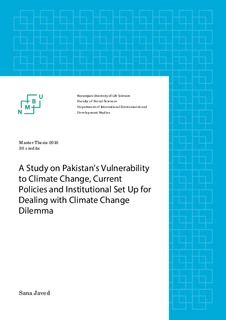| dc.contributor.advisor | Nyborg, Ingrid | |
| dc.contributor.author | Javed, Sana | |
| dc.date.accessioned | 2016-08-12T12:27:56Z | |
| dc.date.available | 2016-08-12T12:27:56Z | |
| dc.date.issued | 2016-08-12 | |
| dc.identifier.uri | http://hdl.handle.net/11250/2399037 | |
| dc.description.abstract | This thesis consist of seven chapters. Chapter one consists of purpose of the study, research questions and theoretical framework or background for the empirical findings in the following chapters. Chapter two provides insight into methodology, research design, data collection methods and the reasons for the choices. The third chapter introduce the study area and gives an overview of the vulnerability of the country to climate change with the help of several studies. Fourth chapter gives description about the Institutional and policy framework for climate change at governmental and provincial level and includes key findings about the gaps or challenges based on the theoretical framework presented in the chapter one. Fifth chapter first involves a brief description of the Institutional framework for Disaster risk management at governmental and provincial level and a critical review on Pakistan national disaster management act 2010. Sixth chapter presents climate budgeting at governmental and provincial level followed by seventh chapter which presents and discusses the organizations working on climatic data collection and research and their challenges. Eight chapter highlights the role of academia. Ultimately, conclusion and some recommendations are made in the end of the thesis. | nb_NO |
| dc.language.iso | eng | nb_NO |
| dc.publisher | Norwegian University of Life Sciences, Ås | |
| dc.subject | Climate change vulnerability | nb_NO |
| dc.subject | Adaptation | nb_NO |
| dc.title | A study on Pakistan’s vulnerability to climate change, current policies and institutional set up for dealing with it | nb_NO |
| dc.type | Master thesis | nb_NO |
| dc.source.pagenumber | 65 | nb_NO |
| dc.description.localcode | M-IES | nb_NO |
